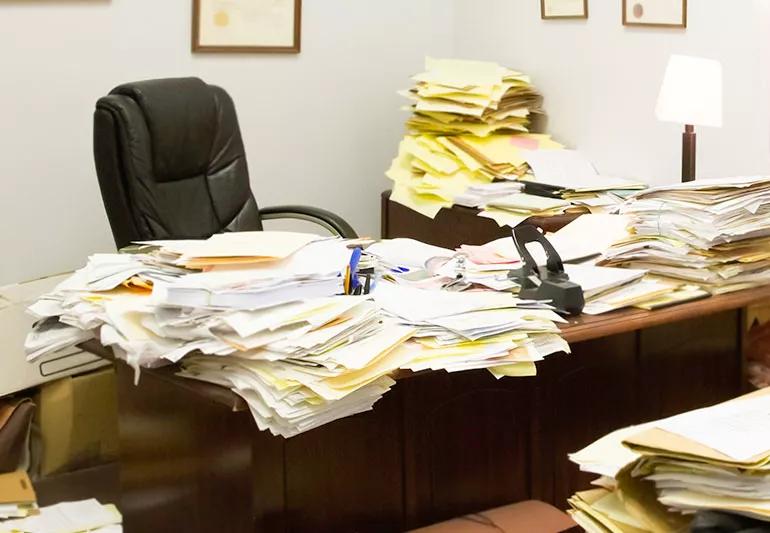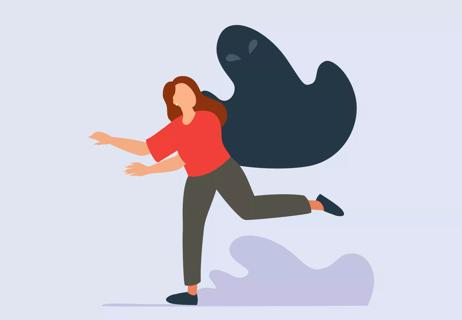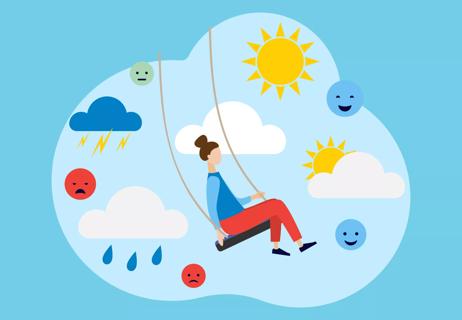How to clear your physical (and mental) space

Oh, clutter. You creep up on us so easily. You hide our registration renewal notice from the DMV under junk mail. You make it impossible to find a replacement light bulb so we buy another instead. You fill our closets with coats for all seasons (and sizes) and drawers with pencils and tchotchkes galore.
Advertisement
Cleveland Clinic is a non-profit academic medical center. Advertising on our site helps support our mission. We do not endorse non-Cleveland Clinic products or services. Policy
If a problem with clutter seems overwhelming, don’t despair. The good news is that you can actually improve your health by getting rid of clutter — and it’s easier than you think.
Clinical psychologist Dawn Potter, PsyD, explains some of the health impacts that clutter may have, and how to know if you’re crossing over into the hoarding zone.
Part of the problem is cultural: We live in a society driven by consumerism, and many people amass things they don’t need simply because acquiring stuff is embedded in our society.
Whether you feel like you must have the latest trends, engage in “retail therapy” to cheer yourself up or succumb to persuasive advertising, you may end up with a house full of items of questionable use.
And because our culture is so focused on acquiring things, many of us have trouble recognizing when we have enough — or too much.
The word “clutter” actually comes from the Middle English word “clotteren.” You might say it can “clot” the flow of life, stopping you from using what you have and making it hard to identify what you really need.
If you struggle to decide what to do with an object once you’re done with it, you might escape the stressful situation by just … not deciding. Once you get into a habit of this, things can start to pile up, and before you know it, there’s a clutter problem.
Advertisement
There are a number of thoughts that people often have that can lead to indecision, including:
The more you struggle with these thoughts, the more likely you are to have a clutter problem.
It’s a matter of severity. If your clutter is making it difficult for you or others to lead a normal lifestyle, or if it’s creating unhealthy living conditions, you may have a problem with hoarding.
“When a person with a hoarding disorder is faced with pressure — because often, they may be faced with pressure from other people to do it — to clean up and throw things out and get rid of things, they will feel emotional distress,” explains Dr. Potter. “They will have great difficulty, parting with things because a core feature of having a hoarding disorder is feeling this strong need to keep things just in case I need them.”
In other words, if you’re able to identify that your clutter is a problem, you’re probably not a hoarder.
On the other hand, having a clutter problem may just mean you haven’t gotten to the mess yet. And all it takes is that wake-up call from a friend or a family member that it’s time to clean up. Dr. Potter explains that, unlike hoarding, those with clutter in their lives aren’t intentionally keeping these items on purpose because they’re afraid of letting them go in case they need them in the future.
“They’re probably just not really all that focused on whether or not there’s clutter around,” Dr. Potter says.
Whether the clutter is rooted in hoarding or just some procrastination, it can impact your health in many ways, and some of them might surprise you.
Clutter can cause you to be:
Advertisement
Here are some ways to cope with clutter and get it out of your life:
“Getting outside help with decision-making about clutter can be very effective,” notes Dr. Potter. “If you are emotionally attached to your things, it can be hard to let others into the process, so pick someone you trust.”
This is effective because your helper won’t experience the same high levels of tension associated with making tough decisions and discarding items, which can make the process faster and less stressful.
Especially if you’re going it alone, it helps to set some guidelines for yourself, and then stick to them. You may decide, “I need to throw out all magazines dated earlier than 2019” or “If I have not worn it in the last two years, it has to go.”
If your clutter problem affects your whole home, it’s unrealistic to expect that you’re going to resolve it in a day or two. Instead, find some way to break the task into smaller parts.
“Depending on how you’re motivated, you might do the biggest job first — the one that provides the most sort of visual change,” says Dr. Potter. “If you’ve got big stuff that you want to get rid of that provides that sense of relief immediately, or you might just start with something small and easy, like, ‘OK, I’m just going to take out all the recycling.’”
Advertisement
You may decide to go room by room, or focus on particular categories — dealing with all clothing in the house, or all the books, for instance.
Many decluttering experts advocate sorting items into three piles: Keep, Donate and Trash.
Make sure that at the end of each decluttering session, you put away the items you’re keeping and put the stuff you’re throwing out in the trash. If possible, take donations immediately to their destination, or at least schedule a time to do so.
If you feel like you can’t get a handle on clutter and your attachment to holding onto items is a sign of hoarding, the good news is that admitting it to yourself is the first, powerful step. The road to addressing a hoarding issue can be difficult, so it’s important to take your time and treat yourself with compassion.
Here are some tips to start getting your hoarding under control:
Advertisement
The environment you live in can have an impact on your mood and health. A clean space can make a difference, and there are ways to begin decluttering your life, no matter the cause. In the same way that clutter builds up — slowly and gradually — it can also be addressed over time, but it’s important to take that first step.
Learn more about our editorial process.
Advertisement

Fishing for compliments, provoking conflict and pouring on the melodrama are all ways of expressing an unmet need

By setting boundaries around how much you give, you can save your time and resources while also being a good person

Certain B vitamins, omega-3 fatty acids and a healthy diet can serve as complementary treatments for schizophrenia

Following your treatment plan, finding a community, staying active and maintaining a healthy diet can help manage this psychiatric condition

Whether it’s playing hooky or faking cancer, malingering behavior is always motivated by personal gain

Causes range from psychological conditions like PTSD to physical conditions like fibromyalgia

Always putting others’ happiness before your own can build resentment over time

Emotional changes, isolation and unusual behavior could signal the onset of the condition

The tropical fruit is a good source of antioxidants and vitamin C

Most people fall asleep within 10 to 20 minutes, but if your experience is different, adjusting your sleep schedule may help

Exploring your hidden side can lead to better understanding of what makes you tick